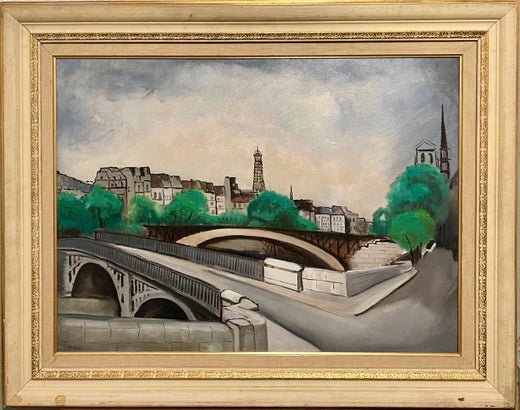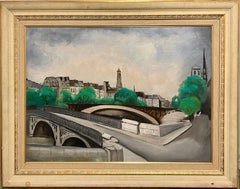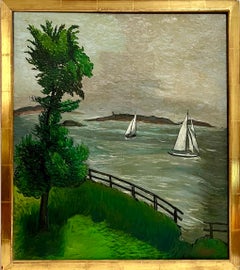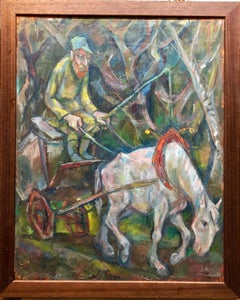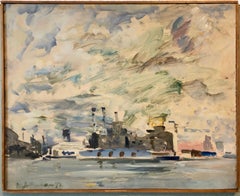Want more images or videos?
Request additional images or videos from the seller
1 of 16
Morris Kantor1927 Oil Painting Eiffel Tower Paris American Modernist Wpa Artist Morris Kantor1927
1927
$18,000List Price
About the Item
- Creator:Morris Kantor (1896 - 1974, Russian)
- Creation Year:1927
- Dimensions:Height: 28.75 in (73.03 cm)Width: 36 in (91.44 cm)
- Medium:
- Movement & Style:
- Period:
- Condition:
- Gallery Location:Surfside, FL
- Reference Number:1stDibs: LU38210347552
Morris Kantor
Morris Kantor was born in Minsk, Russia in 1896, and moved to New York in 1906. Early in his career he experimented with Futurism and Cubism. In 1916 he studied landscape painting with Homer Boss (1882-1956). In 1928, after returning to New York City from a year in Paris, Kantor developed a style in which he combined Realism with Fantasy, often taking the streets of New York as his subject matter. By 1940, he was focusing on figural studies. Today Kantor's work can be found in such institutions as: Whitney Museum of American Art, NY; Metropolitan Museum of Art, NY; Museum of Modern Art, NY; Art Institute of Chicago; Pennsylvania Academy of the Fine Arts. Source: Peter Falk, Who Was Who in American Art
About the Seller
4.9
Platinum Seller
Premium sellers with a 4.7+ rating and 24-hour response times
Established in 1995
1stDibs seller since 2014
1,810 sales on 1stDibs
Typical response time: 1 hour
Authenticity Guarantee
In the unlikely event there’s an issue with an item’s authenticity, contact us within 1 year for a full refund. DetailsMoney-Back Guarantee
If your item is not as described, is damaged in transit, or does not arrive, contact us within 7 days for a full refund. Details24-Hour Cancellation
You have a 24-hour grace period in which to reconsider your purchase, with no questions asked.Vetted Professional Sellers
Our world-class sellers must adhere to strict standards for service and quality, maintaining the integrity of our listings.Price-Match Guarantee
If you find that a seller listed the same item for a lower price elsewhere, we’ll match it.Trusted Global Delivery
Our best-in-class carrier network provides specialized shipping options worldwide, including custom delivery.You May Also Like
Fish Story oil painting by Williams Charles Palmer
Located in Hudson, NY
This painting is illustrated in the Catalogue of the 1945 Encyclopedia Britannica Collection of Contemporary American Painting, p.84. Written and edited by Grace Pagano.
"Painting ...
Category
Mid-20th Century American Modern Figurative Paintings
Materials
Canvas, Oil
$7,500
H 30 in W 36 in
Summer Resort in Michigan -Modernist Mid-Century Saugatuck Oil Painting
Located in Marco Island, FL
Summer Resort in Michigan is an exceptional work painted by the Chicago Modernist, William Schwartz. He studied at the Art Institute of Chicago shortly ...
Category
1940s American Modern Landscape Paintings
Materials
Canvas, Oil
$68,000
H 51 in W 33 in D 2 in
Boys Swimming Industrial Landscape WPA Mid 20th Century Social Realism Modernism
By Henry Ernst Schnakenberg
Located in New York, NY
Boys Swimming Industrial Landscape WPA Mid 20th Century Social Realism Modernism
Henry Schnakenberg (1982 - 1970)
Boys Swimming Industrial Landscape
11 1/2 x 15 1/2 sight
Oil on Canvas
Signed lower left
14 1/2 x 18 1/2 inches, Framed
Bio
In many cases, American artists visited the Armory Show in New York in 1913, and returned to their studios to react to or against what they saw. However, for Henry Ernest Schnakenberg it was much more life altering. Prior to visiting this important exhibition of American and European modernist art...
Category
1940s American Modern Figurative Paintings
Materials
Canvas, Oil
Coney Island Fire Eaters American Scene Modernism WPA Social Realism Mid-Century
Located in New York, NY
Coney Island Fire Eaters American Scene Modernism WPA Social Realism Mid-Century
Frederick "Fritz" Frey Rockwell (1917-1977)
Coney Island Fire Eaters
25 x 30 inches
Oil on Canvas
Si...
Category
1930s American Modern Figurative Paintings
Materials
Canvas, Oil
NYC 1939 World's Fair Mural Study American Scene WPA Modern Mid 20th Century
Located in New York, NY
NYC 1939 World's Fair Mural Study American Scene WPA Modern Mid 20th Century
Eugene Savage (1883 – 1978)
1939 World’s Fair Mural Study
45 x 30 inches
Oil on Canvas
Signed lower right
The painting is part of a 1,000 piece collection of art and objects from the 1939 World’s Fair. The collection as a whole is available.
Savage created the mural for the facade of the Communications Building. An image of the completed mural, along with a published postcard, is part of the listing. Note the center top female figure, she resembles the figure in the offered painting.
BIO
Eugene Francis Savage was born in Covington, Indiana 1883. He underwent various forms of art training in the early years. He was a pupil of The Corcoran Gallery and The Art Institute of Chicago, and was later awarded a fellowship to study in Rome at The American Academy.
While under the spell of that ancient city the young artist began to render historic figures that were suitable for the classic style needed for mural painting in the traditional manor. During this period he was able to study and observe Roman and Greek sculpture, although much of the academic training was accomplished by using plaster casts along with the incorporation of live models. This method survived and was used efficiently throughout Europe and the United States.
After leaving the Academy, Savage was commissioned to paint numerous murals throughout the United States and Europe. This artist received acclaim for the works he produced while under commissions from various sources. This young master was a contemporary of Mexican muralists David Alfaro Siqueiros (1896-1974), Jose Clemente Orozco (1883-1949) and Diego Rivera (1886-1957). In this period he was to show the influence of his contemporaries in formulating a modern style. Savage also played a vital role in the WPA Federal Art program, and he was a member of The Mural Art Guild..
Savage was elected an associate member of The National Academy of Design in 1924 and a full member in 1926. From 1947, he held a professorship at Yale University where he taught mural painting, and some of his students went on to significant positions.
By this time the artist had painted large-scale murals at Columbia, Yale University, Buffalo N.Y., Dallas, Texas, Chicago, Indiana, along with other commissioned works. He also achieved recognition for a series of murals commissioned by the Matson Shipping Line and completed around 1940. For this commission, Savage made many exacting studies of customs and folkways of the Hawaiian natives. However, the award-winning murals were not installed as planned but were put in storage during the war years when the ships were used for troop transportation and were in danger of attack.
However the mural images were reproduced and distributed by the shipping company including nine of the mural scenes that were made into lithographed menu covers in 1948. The American Institute of Graphic Arts awarded certificates of excellence for their graphic production, and the Smithsonian Institute exhibited the works in 1949. Today Savages' Hawaiian Art production is held in high regard by collectors of Hawaiian nostalgia.
In later years the artist focused his attention on a theme that dealt with the customs and tribal traditions of the Seminole Indians of Florida. He produced many variations of this theme throughout his lifetime, and the pictures were usually modest scale easel paintings, precise and carefully delineated. Many of these pictures incorporate Surrealistic elements and show some minor stylistic influences of the painters Kay Sage...
Category
1930s American Modern Figurative Paintings
Materials
Canvas, Oil
"History of US Postal Service" American Scene Social Realism WPA Modern Chicago
By Harold Haydon
Located in New York, NY
"History of US Postal Service" American Scene Social Realism WPA Modern Chicago
Harold Haydon
"History of the U.S. Postal Service"
21 x 25 1/2 inches
O...
Category
1930s American Modern Figurative Paintings
Materials
Canvas, Oil
"Glassblowers" American Scene Social Realism Mid-20th Century New York City WPA
By Ernest Fiene
Located in New York, NY
"Glassblowers" American Scene Social Realism Mid-20th Century New York City WPA
Ernest Fiene (1894-1965)
Glass Blowers
28 x 23 inches
Oil on canvas board
Signed and dated 1944 lower...
Category
1940s American Modern Figurative Paintings
Materials
Oil, Canvas
"Concert" Early 20th Century WPA Modernism American City Landscape Scene Ashcan
By Michael Loew
Located in New York, NY
"Concert" Early 20th Century WPA Modernism American City Landscape Scene Ashcan
The size of the canvas 28 3/4 x 43 1/4 inches. The painting comes directly from the artist's estate. It is signed lower right as well as signed, titled and dated verso.
We have available more than two dozen paintings and works on paper from the 1930s - 80s that come directly from the Loew estate.
BIO
Michael Loew (1907 – 1985) was the son of a New York City baker. After high school, he was an apprentice to a stained-glass maker, and from 1926-1929, he studied at the Art Students League. In 1929, he traveled to Paris, North Africa, Germany, and Italy with a group of artists. When he returned to New York City in 1931, the Great Depression hit Loew unexpectedly, and for the next two years he paid his apartment rent with his paintings. In 1935, he found work with the WPA where he painted murals and partnered up with longtime friend Willem de Kooning in 1939 on a mural for the Hall of Pharmacy at the New York World’s Fair. Their friendship lasted for the rest of their lives. In the mid-30’s he painted in Mexico and the Yucatán documenting the construction of a U.S. Naval airbase on Tinian Island. It was from this airbase that the Enola...
Category
1920s American Modern Figurative Paintings
Materials
Canvas, Oil
Till the Clouds Roll By 1945 Frank Sinatra Mid Century Modern Hollywood Film WPA
By Richard Whorf
Located in New York, NY
Till the Clouds Roll By 1945 Frank Sinatra Mid Century Modern Hollywood Film WPA
TILL THE COULDS ROLL BY (Film Set), oil on canvas, 20 x 24 inches signed “Richard Whorf” lower right and signed and dated on the verso “R. Whorf/ Dec. 21, 1945. Frame by Hendenryk.
ABOUT THE PAINTING
This painting is from the collection of Barbara and Frank Sinatra, dated December 21, 1945 (just nine days after Frank Sinatra’s 30th birthday), and depicts the Metro-Goldwyn-Mayer Culver City backlot during the filming of Till the Clouds Roll By, the direction of the film having been taking over by Richard Whorf in December 1945. It is not presently clear if Whorf gave the Sinatras this painting as a gift, as the presence of the Dalzell Hatfield Galleries label on the verso indicates the painting may have been sourced there. Frank and Nancy Sinatra acquired a number of works from Dalzell Hatfield Galleries during the 1940’s, or perhaps they framed it for the couple.
Sinatra performed “Old Man River’ in the film. Sinatra and June Allyson are depicted in the center of the painting.
PROVENANCE From the Estate of Mrs. Nancy Sinatra; Dalzell Hatfield Galleries, Ambassador Hotel, Los Angeles.
An image of the Dalzell Hatfield label and the back of the original frame (which we replaced with a stunning Heydenrk frame) are attached.
Nancy Sinatra was Fran's first wife. Nancy Rose Barbato was 17 years old when she met Frank Sinatra, an 18-year-old singer from Hoboken, on the Jersey Shore in the summer of 1934. They married in 1939 at Our Lady of Sorrows Church in Jersey City where Frank gave Nancy a recording of a song dedicated to her titled "Our Love" as a wedding present. The young newlyweds lived and worked in New Jersey, where Frank worked as an unknown singing waiter and master of ceremonies at the Rustic Cabin while Nancy worked as a secretary at the American Type Founders.
His musical career took off after singing with big band leaders Harry James and Tommy Dorsey...
Category
1940s American Modern Landscape Paintings
Materials
Canvas, Oil
$75,000
H 31 in W 27 in D 2 in
"Drama Teacher" 1938 WPA Mid 20th Century American Theatre Surrealism Modernism
By Leon Bibel
Located in New York, NY
"Drama Teacher" 1938 WPA Mid 20th Century American Theatre Surrealism Modernism. 30 x 24 inches. Oil on Canvas. Signed land dated ’38 lower left.
The photograph in the listing depicts the artist's friend who taught drama and about whom the painting is based
Painter, printmaker and sculptor, Leon Bibel was born in San Francisco in 1913. He trained at the California School of Fine Arts and received a scholarship to study under the German Impressionist Maria Riedelstein. He worked in collaboration with Bernard Zackheim, a student of Diego Rivera, to create frescoes for the San Francisco Jewish Community Center and the University of California Medical School.
In 1936 Bibel moved from California to join the Federal Art Project at Harlem Art...
Category
1930s American Modern Figurative Paintings
Materials
Canvas, Oil
More From This Seller
View All1927 Oil Painting Eiffel Tower Paris American Modernist Wpa Artist Morris Kantor
By Morris Kantor
Located in Surfside, FL
Morris Kantor New York (1896 - 1974)
Paris from the Ile St. Louis, 1927 (view of Eiffel Tower)
Oil painting on canvas
Hand Signed lower left.
Provenance: Hirshhorn Museum and Scul...
Category
1920s American Modern Landscape Paintings
Materials
Canvas, Oil
1930 Oil Painting Sea Side Sailboats American Modernist WPA Artist Morris Kantor
By Morris Kantor
Located in Surfside, FL
Morris Kantor, American, 1896-1974
Seaside View, 1930
Hand signed M. Kantor and dated 1930 lower right
Oil on canvas
22 1/4 x 19 1/4 inches
24 1/2 x 21 (frame)
Morris Kantor (Belarusian: Морыс Кантор) (1896-1974) was a Russian Empire-born American painter based in the New York City area. This is a beautiful boat scene with a river or lake probably on Long Island.
Born in Minsk on April 15, 1896, Kantor was brought to the United States in 1906 at age 10, in order to join his father who had previously relocated to the states. He made his home in West Nyack, New York for much of his life, and died there in 1974. He produced a prolific and diverse body of work, much of it in the form of paintings, which is distinguished by its stylistic variety over his long career. Perhaps his most widely recognized work is the iconic painting "Baseball At Night", which depicts an early night baseball game played under artificial electric light. Although he is best known for his paintings executed in a realistic manner, over the course of his life he also spent time working in styles such as Cubism and Futurism, (influenced by the Art Deco movement) and produced a number of abstract or non-figural works. A famous cubist, Futurist, painting of his "Orchestra" brought over 500,000$ at Christie's auction house in 2018. Kantor found employment in the Garment District upon his arrival in New York City, and was not able to begin formal art studies until 1916, when he began courses at the now-defunct Independent School of Art. He studied landscape painting with Homer Boss (1882-1956). In 1928, after returning to New York City from a year in Paris, Kantor developed a style in which he combined Realism with Fantasy, often taking the streets of New York as his subject matter. He did some moody Surrealist Nude paintings and fantasy scenes. In the 1940's he turned towards figural studies. Later in his career, Kantor himself was an instructor at the Cooper Union and also at the Art Students League of New York in the 1940s, and taught many pupils who later became famous artists in their own right, such as Knox Martin, Robert Rauschenberg, Sigmund Abeles and Susan Weil...
Category
1930s American Modern Landscape Paintings
Materials
Canvas, Oil
Large Modernist Oil Painting 1940s, Judaica Hasidic Shtetl Wagon Driver WPA Era
By Emanuel Glicenstein Romano
Located in Surfside, FL
Genre: Modern
Subject: Landscape with figure of horse, driver and wagon
Medium: Oil
Surface: wood Board
Hand signed lower middle E.Romano
EMANUEL ROMANO
Rome, Italy, b. 1897, d. 1984
Emanuel Glicen Romano was born in Rome, September 23, 1897.
His father Henryk Glicenstein was a sculptor and was living in Rome with his wife Helena (born Hirszenberg) when Emanuel was born. His father obtained Italian citizenship and adopted the name Enrico. Emanuel was brought up in Italy, Switzerland, Germany, England and Poland.
In 1926 Emanuel Glicenstein Romano and his father sailed for New York. They briefly visited Chicago. Romano's sister, Beatrice, and mother only joined them in New York years later.
Romano changed his name on his arrival to America and some have erroneously speculated that this was to avoid antisemitic discrimination. In truth, as the son of a highly-regarded artist, Romano changed his name to ensure that any success or recognition he would later attain, would be the result of nothing other than his own merit as an artist, and not on account of his father's fame.
In 1936 Romano was worked for the WPA Federal Art Project creating murals. ( there were many jewish artists active with in the WPA period. notably Chaim Gross, Ben Shahn, Isaac and Moses Soyer, Abraham Rattner and many others. During and immediately after World War II, Romano created a series of allegorical works depicting graphic holocaust images that were held closely by the family until after his passing. One of these works is now on permanent display in the Florida Holocaust Museum in St. Petersburg Florida.
Emanuel's father died in 1942 in a car accident before they could realize their shared dream of visiting Israel.
In 1944 Romano, having completed his degree at the Pennsylvania Academy of Fine Arts and the Art Institute of Chicago, began teaching at the City College of New York.
Romano moved to Safed, Israel in 1953 and established an art museum in his father's memory, the Glicenstein Museum.
COLLECTIONS
Indianapolis Museum of Art
Metropolitan Museum of Art
Boston Fine Arts Museum
Fogg Museum
Musée Nacional de France
Recently his work has been added to the Florida Holocaust Museum collection. His notable works include his holocaust themed allegorical paintings as well as portraits of Marianne Moore, his father and William Carlos Williams...
Category
1930s American Modern Figurative Paintings
Materials
Oil, Board
1972 Gestural Oil Painting Boat in Harbor Figural Abstraction Raoul Middleman
By Raoul Middleman
Located in Surfside, FL
Raoul Middleman (born 1935 in Baltimore, Maryland) is an American painter. Middleman has been a member of the Maryland Institute College of Art faculty since 1961. American University Museum at the Katzen Center has described Middleman as a "Baltimore maestro [whose] nudes are not pretty—they are sagging, dimpled, and real. His cityscapes reveal the underbelly of post-industrial rot, his narrative paintings give contemporary life to his personal obsessions. They are intelligent, messy, and utterly masterful."
From an interview with RM "I was doing abstract art. Then Roy Lichtenstein came around, and I wanted to be current. I remember Grace Hartigan said, “You’ve gotta go to New York, seize destiny by the hand.” My friend Jon Schueler took my slides up to Eleanor Ward, who had the Stable Gallery. My Pop art paintings were discovered. I moved to New York into Malcolm Morley’s old loft down on South Street. Agnes Martin was upstairs... People who interest me come from different quarters. I knew guys around Schueler, like B.H. Friedman. But I also knew the Pop world pretty well – Al Hansen, Richard Artschwager, Lichtenstein. I became friends with Raoul Hague...
Category
1970s American Modern Landscape Paintings
Materials
Oil, Board
Simka Simkhovitch WPA Artist Oil Painting American Modernist Landscape w Tower
By Simka Simkhovitch
Located in Surfside, FL
Simka Simkhovitch (Russian/American 1893 - 1949)
This came with a small grouping from the artist's family, some were hand signed some were not.
These were studies for larger paintin...
Category
1930s American Modern Landscape Paintings
Materials
Oil, Board
Simka Simkhovitch WPA Artist Oil Painting American Modernist Landscape Pond Tree
By Simka Simkhovitch
Located in Surfside, FL
Simka Simkhovitch (Russian/American 1893 - 1949)
This came with a small grouping from the artist's family, some were hand signed some were not.
These were studies for larger paintin...
Category
1930s American Modern Landscape Paintings
Materials
Oil, Board
Recently Viewed
View AllMore Ways To Browse
Nude Sketchings By Famous Artists
Social Realism Social Realism Art 1930s And 1940s
Curry John Steuart
Baseball Paintings
Eiffel Tower Paintings
Antique Baseball
1920 Modernist Painting
Isaac Soyer
Orchestra Paintings
Eiffel Tower Oil
Eiffel Oil Painting
Paris Eiffel Tower Painting
Oil Painting Eiffel Tower
Artist Painting Landscape Wpa
Robert Abele
19th Century Maritime Oil Paintings
Paintings With Houses
Blue Waves Painting
